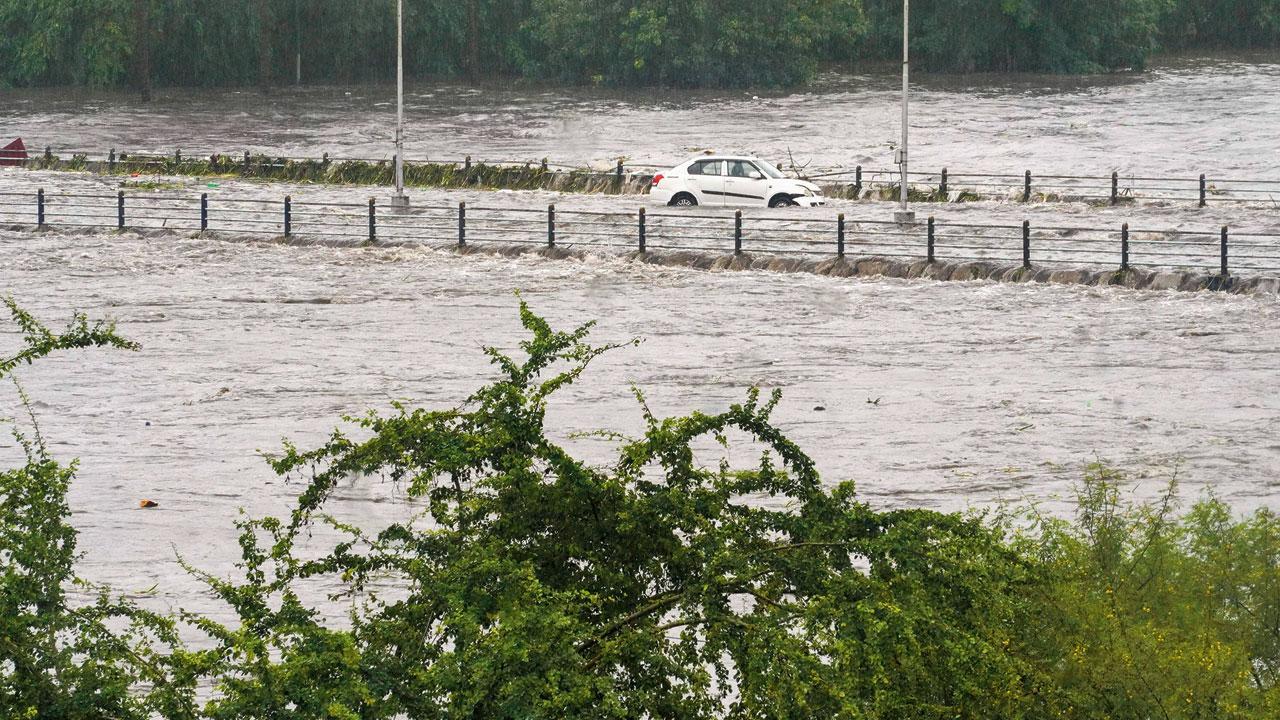Planning, if it exists at all, goes haywire as rules are bent, abused, and violations go unpunished. Enlightenment happens when disaster strikes

A car moves through a flooded area during heavy rain, in Pune, on July 25. Pic/PTI
 Urban jungles are being flooded like never before. Delhi, Mumbai, Pune, Nagpur, Kolhapur, Sangli, Mumbai. The list could be endless. Blame it on uncontrolled development. Some cities and towns may be affected for purely natural reasons, but most, as the findings go, fall to man-made problems that encourage and compound flooding situations. The genesis of such problems lies in an ecosystem of individuals, who are influencers by way of their positions in politics, policy-making and administration. Add to it the greed of the real estate business class that exploits the needs of consumers. Planning (if it exists at all) goes haywire as rules are bent and abused and violations turned a blind eye to. Enlightenment happens when a disaster strikes. All of a sudden, factors like excessive rains, dereliction of duty, misleading weather reports etc are blamed. Real reasons are debated only as an academic interest. Temporary measures are put in place. The permanent ones aren’t necessarily nature-friendly.
Urban jungles are being flooded like never before. Delhi, Mumbai, Pune, Nagpur, Kolhapur, Sangli, Mumbai. The list could be endless. Blame it on uncontrolled development. Some cities and towns may be affected for purely natural reasons, but most, as the findings go, fall to man-made problems that encourage and compound flooding situations. The genesis of such problems lies in an ecosystem of individuals, who are influencers by way of their positions in politics, policy-making and administration. Add to it the greed of the real estate business class that exploits the needs of consumers. Planning (if it exists at all) goes haywire as rules are bent and abused and violations turned a blind eye to. Enlightenment happens when a disaster strikes. All of a sudden, factors like excessive rains, dereliction of duty, misleading weather reports etc are blamed. Real reasons are debated only as an academic interest. Temporary measures are put in place. The permanent ones aren’t necessarily nature-friendly.
ADVERTISEMENT
In Pune, the Mula-Mutha rivers became what Mithi river had turned out to be for Mumbai in the first decade of the 21st century. Uncontrolled constructions on the banks of these rivers led to the disasters. Pune was hit badly last week, because like Mumbai, the Pune rivers’ abuse was ignored by the blindfolded. The discharge from the dam swelled water levels. It is still not clear whether people living on the banks were alerted on time by the local authorities. Similarly, in Nagpur, haphazard development by an amusement park had led to the flooding of localities along the Nag river. In the recent Union Budget, the river projects in Pune and Nagpur have been allotted good funds. It is to be seen whether the hazards—the structures are purely illegal and those granted legality by the planners—are razed. Mumbai’s Mithi still continues to be a threat, many years after the governments started working on making it less dangerous.
In Delhi, two civil services aspirants died after rainwater accumulated on the road flooded the library in the basement of a prominent coaching centre. Another student remained struck till late Saturday night. The Delhi government has ordered an inquiry. It may appear to be a freak accident, but there could always be more than meets the eye. Likewise, we have seen fires that gutted hospitals and cinema halls, killing innocent people. Inquiries revealed the reasons and individuals behind the trigger. But those were the small fry. The big fish were never netted. It has been happening for an eternity—no matter which government was there and who ran it.
Urban planners and environmentalists have cautioned in the case of Mumbai that the way the rising number of infrastructure projects such as metros, roads and flyovers, and private projects, are being worked upon, will add to the city’s woes in years to come if the problems seen this monsoon are not remedied. It is said the solutions for issues, if any, should be part of the planning. But what we have seen is that, mostly the project mentors and the agencies/contractors they hire have a realisation when it’s too late.
Dharmendra Jore is political editor, mid-day. He tweets @dharmendrajore
Send your feedback to mailbag@mid-day.com
 Subscribe today by clicking the link and stay updated with the latest news!" Click here!
Subscribe today by clicking the link and stay updated with the latest news!" Click here!












